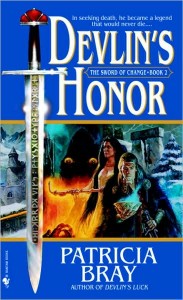 Once upon a time, the Kingdom of Jorsk was a mighty realm, expanding its borders aggressively. A generation ago, they conquered the Caerfolk of Duncaer through bloody means. In the process, the Chosen One, hero and protector of Jorsk, was killed, and his mythic weapon, the Sword of Light, lost for all time. Or so they thought.
Once upon a time, the Kingdom of Jorsk was a mighty realm, expanding its borders aggressively. A generation ago, they conquered the Caerfolk of Duncaer through bloody means. In the process, the Chosen One, hero and protector of Jorsk, was killed, and his mythic weapon, the Sword of Light, lost for all time. Or so they thought.
Today, the Chosen One of Jorsk is Devlin Stonehand, former metalsmith and farmer, declared kin-bereft and exiled from his homeland after his family was killed. With no reason to live, he went to the city of Kingsholm, and volunteered for the post of Chosen One, latest in a line of would-be heroes that had filled the ill-fated post ever since the Sword of Light was lost. Bound by a magical Geas, charged to defend Jorsk with his life, Devlin did the impossible: he survived. Time and again, he beat the odds, destroying threats to the Kingdom. Bandits and sea monsters fell to his might, and a traitor was exposed and killed, though Devlin was injured severely in the process. (This back-story is told in the first novel in this series, Devlin’s Luck.)
Now, Devlin stands in a precarious position of power, distrusted and disliked by many, and shunned by those who stand to lose by his outspoken nature. Even his one-time ally, the King, sees him as a liability. And so Devlin is charged with another impossible task, to find the missing Sword of Light. If he does, he will be able to truly claim the title and position of Chosen One, and his enemies will be unable to denounce him. With his minstrel friend Stephen and military escort Lieutenant Nils Didrik accompanying him, Devlin returns to Duncaer, to face his past and seek his destiny.
As the Chosen One, Devlin stands for everything the Caerfolk hate; he’s a traitor, an oppresser, one of their own gone bad. As a Caerfolk, he is kin-bereft and exiled, cast out from a society that values family above all else. Either way, he’s in for a bad reception, especially when a new group of extremist rebels surfaces, dedicated to freeing Duncaer at any cost. They have the Sword of Light, and Devlin has to play along if he ever wants a shot at retrieving it. In the process, Devlin will confront his demons, be forced to overcome his doubts, and wrestle with issues of faith that could drive him mad and drag him down forever.
Devlin’s Honor overcomes the traditional “middle child” syndrome that tends to plague the second book in a trilogy, by building on what has come before and taking it into a not-entirely-unexpected direction. By taking the action away from Jorsk, and dropping Devlin back into his old culture, Bray is able to fully play with the contrasts in cultures, exploit the culture shock felt by Devlin in particular, and explore the values which shaped his upbringing. The name of the trilogy is The Sword of Change, but the sword, if anything, is just the catalyst, and the true “changing” involved is Devlin’s. In dealing with his past and his people, he becomes aware of his role in the world as a whole, his part to play, and the magnitude of his duties.
Some fantasy stories are about magic, and action, and epic battles. Others managed to give us all that, while keeping the spotlight tightly focused on the personal growth of one character. This is the latter. Devlin’s Luck managed to put a spin on the not-quite-tired trope of “the chosen one”; Devlin’s Honor is about family, and fate, and obligations, and loyalties. Introspective and interesting, it’s as good as, if not better than, the first in the trilogy, and I’m looking forward to seeing how it all comes together in the end. I’m hard pressed to find any glaring flaws in it so far. If you like fantasy that’s more about people than it is about epic struggles and world-changing events, this trilogy may just be for you.
